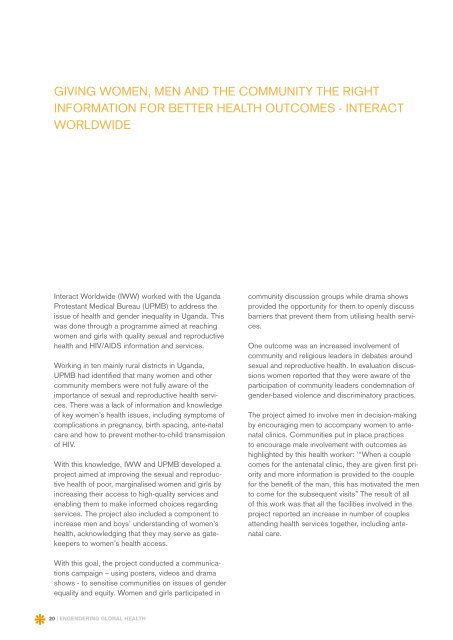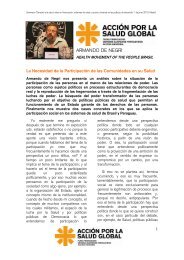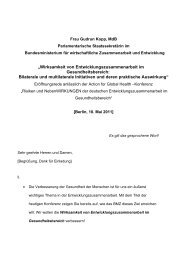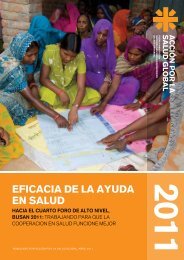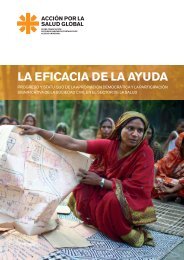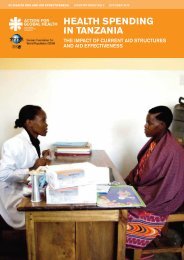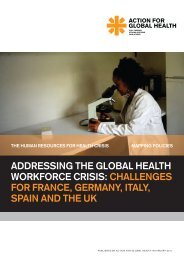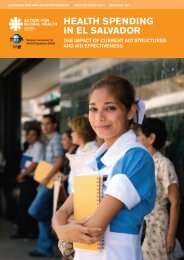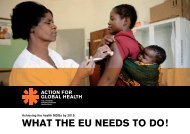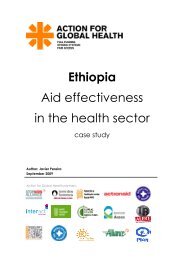Engendering Global Health - Action for Global Health
Engendering Global Health - Action for Global Health
Engendering Global Health - Action for Global Health
Create successful ePaper yourself
Turn your PDF publications into a flip-book with our unique Google optimized e-Paper software.
Giving women, men and the community the right<br />
in<strong>for</strong>mation <strong>for</strong> better health outcomes - Interact<br />
Worldwide<br />
Interact Worldwide (IWW) worked with the Uganda<br />
Protestant Medical Bureau (UPMB) to address the<br />
issue of health and gender inequality in Uganda. This<br />
was done through a programme aimed at reaching<br />
women and girls with quality sexual and reproductive<br />
health and HIV/AIDS in<strong>for</strong>mation and services.<br />
Working in ten mainly rural districts in Uganda,<br />
UPMB had identified that many women and other<br />
community members were not fully aware of the<br />
importance of sexual and reproductive health services.<br />
There was a lack of in<strong>for</strong>mation and knowledge<br />
of key women’s health issues, including symptoms of<br />
complications in pregnancy, birth spacing, ante-natal<br />
care and how to prevent mother-to-child transmission<br />
of HIV.<br />
With this knowledge, IWW and UPMB developed a<br />
project aimed at improving the sexual and reproductive<br />
health of poor, marginalised women and girls by<br />
increasing their access to high-quality services and<br />
enabling them to make in<strong>for</strong>med choices regarding<br />
services. The project also included a component to<br />
increase men and boys’ understanding of women’s<br />
health, acknowledging that they may serve as gatekeepers<br />
to women’s health access.<br />
community discussion groups while drama shows<br />
provided the opportunity <strong>for</strong> them to openly discuss<br />
barriers that prevent them from utilising health services.<br />
One outcome was an increased involvement of<br />
community and religious leaders in debates around<br />
sexual and reproductive health. In evaluation discussions<br />
women reported that they were aware of the<br />
participation of community leaders condemnation of<br />
gender-based violence and discriminatory practices.<br />
The project aimed to involve men in decision-making<br />
by encouraging men to accompany women to antenatal<br />
clinics. Communities put in place practices<br />
to encourage male involvement with outcomes as<br />
highlighted by this health worker: ‘“When a couple<br />
comes <strong>for</strong> the antenatal clinic, they are given first priority<br />
and more in<strong>for</strong>mation is provided to the couple<br />
<strong>for</strong> the benefit of the man, this has motivated the men<br />
to come <strong>for</strong> the subsequent visits” The result of all<br />
of this work was that all the facilities involved in the<br />
project reported an increase in number of couples<br />
attending health services together, including antenatal<br />
care.<br />
With this goal, the project conducted a communications<br />
campaign – using posters, videos and drama<br />
shows - to sensitise communities on issues of gender<br />
equality and equity. Women and girls participated in<br />
20 | <strong>Engendering</strong> <strong>Global</strong> <strong>Health</strong>


